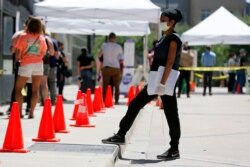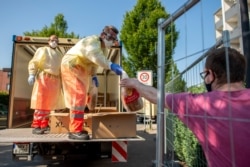While some health experts warn of what they call a second wave of COVID-19 this fall, others say the United States — and some other parts of the world — are not over the first wave.
"When you have 20,000-plus infections per day, how can you talk about a second wave?" said Dr. Anthony Fauci, the country's top infectious disease expert.
Much of the U.S. is easing restrictions implemented to halt the spread of the coronavirus, even as the number of cases has started rising in some states, especially in the South and West.
Some of the experts, including Caitlin Rivers, a disease researcher at Johns Hopkins University’s Center for Health Security, say they don’t even want to use the words “second wave” because they say that gives people a false sense of believing the worst is over.
U.S. President Donald Trump has said he believes the high number of reported coronavirus cases is because of testing.
“When you do testing to that extent, you’re going to find more cases. So, I said to my people, ‘Slow the testing down.’ They test and they test,” Trump told the crowd at Saturday night's rally in Tulsa, Oklahoma.
The White House later said the president was just joking.
But the director of the Harvard Global Health Institute, Dr. Ashish Jha, says there’s nothing funny about COVID-19.
“This is incredibly frustrating for the millions of Americans who have gotten sick and have not been able to get tests. … This is unfortunately not a joke," Jha told CNN Sunday.
Many viruses, such as the flu, get worse in the winter when more people stay indoors and the weather is not as warm. But since COVID-19 is a new coronavirus, scientists say they are still not sure what they are dealing with and how the change of seasons will affect it.
World Health Organization Director-General Tedros Adhanom Ghebreyesus said last week that the pandemic is accelerating.
“We are in a new and dangerous phase,” Tedros said, adding that lockdown measures are still needed to halt the spread of the virus even while such measures are being eased around the world.
In Germany, authorities say the coronavirus reproduction rate is rising to a level higher than what experts say is needed for long-term containment of the virus.
The authorities reported a 2.88 reproduction rate Sunday – meaning for every 100 people who get COVID-19, an additional 288 people will become infected.
The reproduction rate was 1.79 Saturday, and experts say a number of 1 or less is necessary to consider the outbreak contained.
Germany has started easing coronavirus-related lockdowns and other restrictions after what it had regarded as success in fighting COVID-19.
Authorities blame the surge in German cases on outbreaks inside such places as nursing homes, hospitals and facilities housing refugees and asylum-seekers.
On Sunday, the thousands of worshippers who usually flock to Stonehenge to watch the sun rise on the first day of summer made their pilgrimage a virtual one this year.
The body that oversees Stonehenge, English Heritage, said more than 3.6 million people tuned in as the sun broke Sunday morning.
Britain has a ban on large gatherings to curb the spread of the coronavirus that causes COVID-19, but a small group of druids, those who say they are descended from the ancient religion, gathered in a nearby field to watch in person.
Also Sunday, Bulgarian tennis star Grigor Dimitrov announced he is ill with the coronavirus, the highest-profile tennis player to come down with the disease so far.
"I want to reach out and let my fans and friends know that I tested positive back in Monaco for COVID-19," Dimitrov wrote on Instagram. "I want to make sure anyone who has been in contact with me during these past days gets tested and takes the necessary precautions.”
He says he is home and recovering and apologized for any harm he might have caused.
Dimitrov pulled out of the Adria Tour match in Zadar, Croatia, Saturday, saying he felt sick. The finals of the Zadar leg of the tour have also been canceled.







